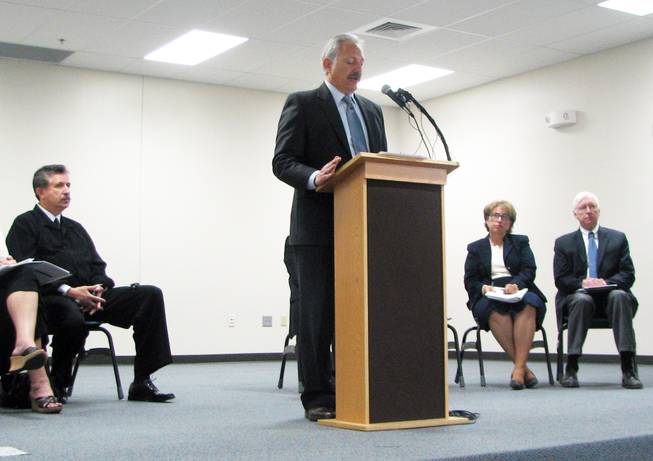
Dr. Lawrence Sands, chief health officer for the Southern Nevada Health District, talks to reporters during a back-to-school press conference Wednesday at Gordon McCaw Elementary School in Henderson. To his left is School Board member Larry Mason, and to his right are Diana Taylor, director of health services for the Clark County School District, and Dr. John Middaugh of the Health District.
Wednesday, Aug. 19, 2009 | 2:35 p.m.
Audio Clip
- Clark County Schools Superintendent Walter Rulffes addresses the media in advance of school starting Monday.
-
Other stories
Archive
School and health officials are preparing for the spread of the H1N1 swine flu virus once the school year begins on Monday.
The Southern Nevada Health District has tracked the spread of the flu strain through surveillance of local pediatricians’ offices during the summer and found that about half of the cases of flu-like symptoms were the result of the H1N1 virus, Dr. Lawrence Sands, chief health officer, said.
“This confirmed every week that it is circulating in the community,” he said.
The good news, Sands said, is that the cases are relatively mild. The cases so far have looked and acted like a regular flu.
Swine flu was one of the topics covered during a back-to-school press conference today at Gordon McCaw Elementary School in Henderson. Clark County Schools Superintendent Walt Rulffes, health officials and School Board trustees discussed enrollment, budget cuts and plans to deal with a potential outbreak of flu during the upcoming school year.
Rulffes and Sands said that an outbreak of the H1N1 virus would not likely prompt school closures unless too many staff members were out sick to hold classes. Any closure decisions would be made on a case-by-case basis, Rulffes said.
Sands noted that the federal Centers for Disease Control and Prevention found this year that closing schools does not control the H1N1 virus. If anything, the CDC found, it helps spread it, he said.
In June, Marion Earl Elementary School on Tropicana Avenue and Jones Boulevard in Las Vegas did not close even after half of its students were absent because of possible swine flu cases there.
The CDC estimates 1 million Americans have been exposed to the virus, he said, though not all of them have fallen ill. The milder-than-expected nature of the virus is what prompted the CDC to change its recommendation about school closure, he said.
While the flu can be serious for some people, “for the majority of people, it’s a relatively mild disease,” Sands said. “Most people recover without seeking medical treatment.”
Seven people have died this year in Southern Nevada from the H1N1 virus.
The Las Vegas area will receive H1N1 vaccines from the federal government, Sands said, but health officials do not know yet how many doses. They expect to begin receiving the vaccine in mid-October, with additional shipments throughout the year.
Once more is known about the stock of vaccine, he said, the Health District would set priorities of who should receive the immunizations.
The CDC recommends first priority be given to pregnant women and caregivers or those who live with children less than six months old first, then to health-care workers and emergency response personnel. After that, people between six months and 24 years old would get the vaccine, and finally people from age 25 to 64 with chronic medical conditions or compromised immune systems.
The CDC has found that younger people seem more prone to the virus than older ones, Health District spokeswoman Stephanie Bethel said, and that complications occur more frequently in people under 24.
Sands said the best way to protect children from the virus is to follow common-sense health practices: washing hands frequently and staying home from school when a child is sick.

Join the Discussion:
Check this out for a full explanation of our conversion to the LiveFyre commenting system and instructions on how to sign up for an account.
Full comments policy